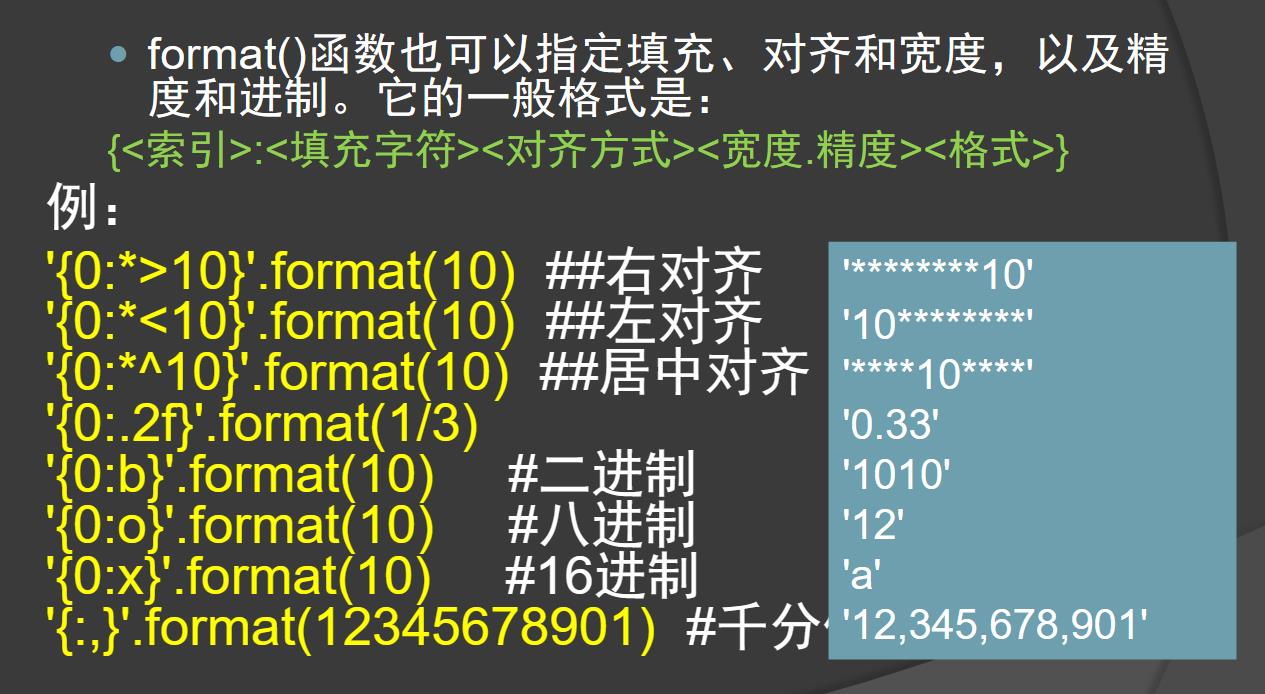python中字符串的fommat方法
Posted NoteBlogSgj
tags:
篇首语:本文由小常识网(cha138.com)小编为大家整理,主要介绍了python中字符串的fommat方法相关的知识,希望对你有一定的参考价值。

python 比较python中各种字符串连接方法的性能
from functools import wraps
import pickle
from random import randint, choice
import string
import pathlib
import time
import sys
big_list = [] # our huge list of tuples
cache_file = "test-data-cache.pickle"
def chrono(msg='', format_time=False):
def decorator(func):
@wraps(func)
def wrapper(*args, **kwargs):
local_chrono = Chrono()
res = func(*args, **kwargs)
local_chrono.stop(msg, format_time)
return res
return wrapper
return decorator
class Chrono(object):
def __init__(self):
self._start_time = time.perf_counter()
@staticmethod
def _format_time(t) -> str:
hh = t // 3600
mm = (t % 3600) // 60
ss = t - (hh * 3600) - (mm * 60)
return "%02dh%02dm%02ds" % (hh, mm, ss)
def stop(self, msg='', format_time=False) -> float:
stop_time = time.perf_counter()
t_elapsed = stop_time - self._start_time
if msg: # print message if any
if format_time:
t_str = self._format_time(t_elapsed)
else:
t_str = "%.3f seconds" % t_elapsed
print("[ elapsed %s ] - %s" % (t_str, msg), file=sys.stderr)
return t_elapsed
def rand_str():
allchar = string.ascii_letters + string.digits
return "".join(choice(allchar) for _ in range(randint(6, 18)))
def build_list(n):
global big_list
c = Chrono()
for i in range(n):
tpl = (
rand_str(), str(randint(0, 655359999)), str(randint(0, 65535999)), str(randint(0, 655359999)), rand_str())
big_list.append(tpl + tpl + tpl + tpl) # each records has 20 fields
c.stop(f"built list of {list_size} items")
# save for later
dumpfile = open(cache_file, 'wb')
c = Chrono()
pickle.dump(big_list, dumpfile)
c.stop("dump cache file")
dumpfile.close()
def load_list():
global big_list
dumpfile = open(cache_file, 'rb')
c = Chrono()
big_list = pickle.load(dumpfile)
c.stop(f"load cache file : {len(big_list)} records")
dumpfile.close()
@chrono('str.join()')
def test_join():
arr = []
for item in big_list:
s = "|".join(item)
arr.append(s)
return arr[-1]
@chrono("percent formatting")
def test_percent_format():
arr = []
for item in big_list:
s = "%s|%s|%s|%s|%s|%s|%s|%s|%s|%s|%s|%s|%s|%s|%s|%s|%s|%s|%s|%s" % (
item[0], item[1], item[2], item[3], item[4], item[5], item[6], item[7], item[8], item[9], item[10],
item[11], item[12], item[13], item[14], item[15], item[16], item[17], item[18], item[19])
arr.append(s)
return arr[-1]
@chrono("f-string formatting")
def test_fstring_format():
arr = []
for item in big_list:
s = f"{item[0]}|{item[1]}|{item[2]}|{item[3]}|{item[4]}|{item[5]}|{item[6]}|{item[7]}|" \
f"{item[8]}|{item[9]}|{item[10]}|{item[11]}|{item[12]}|{item[13]}|{item[14]}|{item[15]}|" \
f"{item[16]}|{item[17]}|{item[18]}|{item[19]}"
arr.append(s)
return arr[-1]
@chrono("multiple string concat (+)")
def test_string_concat():
arr = []
for item in big_list:
s = item[0] + "|" + item[1] + "|" + item[2] + "|" + item[3] + "|" + item[4] + "|" + item[5] + "|" + item[
6] + "|" + item[7] + "|" + item[8] + "|" + item[9] + "|" + item[10] + "|" + item[11] + "|" + item[
12] + "|" + item[13] + "|" + item[14] + "|" + item[15] + "|" + item[16] + "|" + item[17] + "|" + item[
18] + "|" + item[19]
arr.append(s)
return arr[-1]
@chrono("str.format()")
def test_format_function():
arr = []
for item in big_list:
s = "{0}|{1}|{2}|{3}|{4}|{5}|{6}|{7}|{8}|{9}|{10}|{11}|{12}|{13}|{14}|{15}|{16}|{17}|{18}|{19}".format(
item[0], item[1], item[2], item[3], item[4], item[5], item[6], item[7], item[8], item[9], item[10],
item[11], item[12], item[13], item[14], item[15], item[16], item[17], item[18], item[19])
arr.append(s)
return arr[-1]
if __name__ == '__main__':
p = pathlib.Path(cache_file)
list_size = 500000
if p.exists():
load_list()
if not len(big_list) == list_size:
print("... rebuliding the list")
big_list = []
build_list(list_size)
else:
build_list(list_size)
v1 = test_join()
v2 = test_percent_format()
v3 = test_fstring_format()
v4 = test_string_concat()
v5 = test_format_function()
success = v1 == v2 == v3 == v4 == v5
if success:
print("Success: All functions generated the same results")
exit(0)
else:
print("Error: Output results are not the same:")
[print(v) for v in (v1, v2, v3, v4, v5)]
exit(1)以上是关于python中字符串的fommat方法的主要内容,如果未能解决你的问题,请参考以下文章